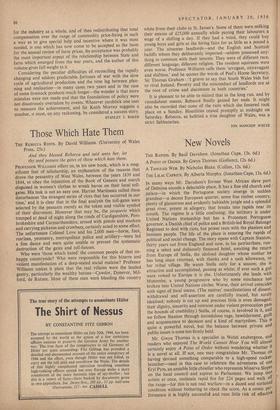Those Which Hate Them
And they blessed Rebecca and said unto her, let thy seed possess the gates of those which hate them.
PROFESSOR WILLIAMS offers us, in his new book, which is a mag- nificent feat of scholarship, an explanation of the reasons that drove the peasantry of West Wales, between the years 1839 and 1844, to obey the injunction of the Book of Genesis and march disguised in women's clothes to wreak havoc on their local toll- gates. His task is not an easy one. Harriet Martineau called these disturbances 'the strangest series of riots that has occurred in our time,' and it is clear that in the final analysis the toll-gates were selected by the peasants merely as the token and visible symbol of their discontent. However that may be, the jacquerie which tramped at dead of night along the roads of Cardiganshire, Pem- brokeshire and Carmarthenshire, armed with pistols and muskets and carrying pickaxes and crowbars, certainly acted to some effect. The unfortunate Colonel Love and his 2,000 men—horse, foot, marines, yeomanry, metropolitan police and artillery—were led a fine dance and were quite unable to prevent the systematic destruction of the gates and toll-houses.
Who were 'those which hated' the common people of that un- happy countryside? Who were responsible for this bizarre and violent manifestation of a deep-seated social malaise? Professor Williams makes it plain that the real villains were the landed gentry, particularly the wealthy barons—Cawdor, Dynevor, Mil- ford, de Rutzen. Most of these men were bleeding the country white from their clubs in St. James's. Some of them were milking their estates of £25,000 annually while paying their labourers a wage of a shilling a day. If they had a mind, they could buy young boys and girls at the hiring fairs for as little as a pound a year. The absentee landlords—and the English and Scottish bailiffs whom they deliberately imported—seldom possessed any- thing in common with their tenants. They were of different race, different language, different religion. The resident squireens were even worse. Professor Williams calls them 'arrogant, extravagant and shiftless,' and he quotes the words of Peel's Home Secretary, Sir Thomas Graham : 'I grieve to say that South Wales bids fair to rival Ireland. Poverty and the misconduct of landlords are at the root of crime and discontent in both countries.'
It is pleasant to be able to record that in the long run, and by roundabout means. Rebecca finally gained her ends. It might also be recorded that none of the riots which she fostered took place on a Sunday. Hostilities ceased promptly at midnight on Saturday. Rebecca, as befitted a true daughter of Wales, was a strict Sabbatarian.
JON MANCHIP WHITE


































 Previous page
Previous page